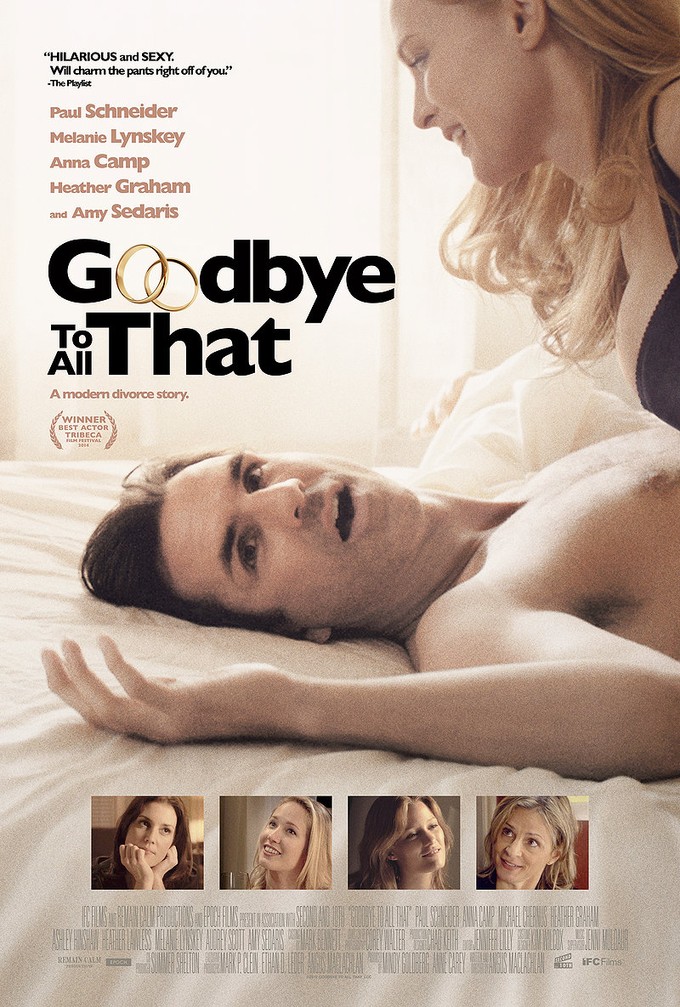
Angus MacLachlan started out as an actor, but when his first produced screenplay, JUNEBUG, was an indie hit (and launched the career of Amy Adams), he became a full-fledged screenwriter. Now, he's turned his eye to directing, and his first film, GOODBYE TO ALL THAT, is a sweet, low-key dramedy about a father (played by Paul Scheider) who has to reenter the daring scene when his wife (Melanie Lynskey) springs a divorce on him. It's a funny, touching film that's simultaneously honest, quirky, and surprisingly sexy, featuring a bevy of strong female performances by people like Heather Lawless, Heather Graham, Amy Sedaris, Anna Camp, Celia West, and the young Audrey Scott.
In our brief time, MacLachlan and I chatted, among other things, about stepping behind the camera for the first time, the importance of casting, and the influence of his JUNEBUG director, Phil Morrison. I will warn you that the last question veers directly into HEAVY SPOILER TERRITORY, so I'd advise you not to finish this up if you are planning to see the film:
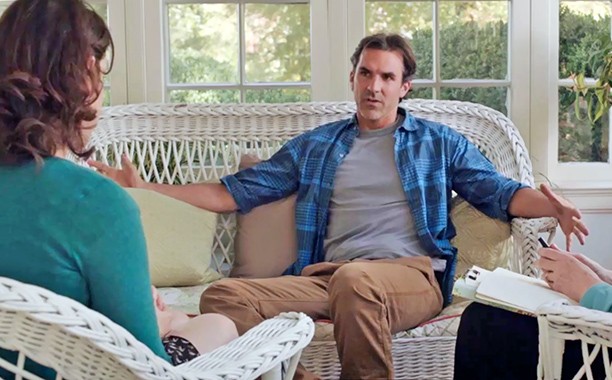
VINYARD: I just want to get started by talking about the genesis of this. Obviously, you wrote the film yourself, so I want to know if it came from a place…how personal of a place did it come from? Was this something you were personally going through, or something you were seeing a lot of? How did this come about? Why did you feel the need to make this movie?
ANGUS: Well, I am married, and I do have a daughter, but I am not divorced. It actually was inspired by a number of things that happened to really good friends of mine who had gone through breakups, one friend in particular. I kept hearing these stories that were horrifying, and funny, and erotic, and exciting, and I kept thinking, "Man, I'm gonna have to write something about that." So it really did come from personal experience, but from people that I knew.
VINYARD: 'Cause it's kind of about dating in 2014, how things have changed from maybe 15, 20 years ago. Was that an impetus for you to tackle this subject, just seeing how things have changed and how radically the dating scene had been altered from maybe 10, 15 years ago?
ANGUS: Absolutely, absolutely. Almost all the plot points happen because of the electronic age. Someone texts you, or someone finds you on Facebook, or you spy on Facebook. You can't get ahold of your daughter because she only texts. I think things have changed. OK Cupid, you can have this kinda pickup, it's about sex in a way that wasn't there 10 years ago, probably wasn't there 5 years ago. So that was a real intention. And at the same time, we still feel lonely and want connection. We want to be seen, we want to be known. It's easier to connect with like old friends, but you still don't talk to people. There's a couple of conversations when he calls his daughter, and he goes, "Oh, I'm so glad you picked up!" Because it's unusual now when people answer the phone!
VINYARD: Do you think that, in 2014, marriage is sort of impossible because of all these new forms of communication like, as you said, from old friends invading your life on a regular basis?
ANGUS: I don't know if it's impossible. Actually, I was reading an article in the Times I think a couple of days ago that said the divorce rate is actually falling from 5 years ago. I think access is easier. It doesn't necessarily make intimacy any easier. In my film, when he finally has the conversation with his old camp girlfriend, Lara, it's because they knew each other from a long time ago, and they jump right back to that way of speaking to each other .When she brings up the death of her child, he's really touched in a very intimate way that he hasn't with these other women. He's able to say he's getting divorced, and she says, "Yeah, I know. Did you break her heart, or did she break yours?" They have a certain intimacy, because of a history they shared a long time ago. That's what you really want. Everybody in the film really wants to be seen. Even in the humorous aspect, Debbie Spengler, who keeps saying, "I'm Debbie Spengler!" She wants to be seen, in some way!
VINYARD: I was surprised at seeing Heather Lawless in that role. I was really blown away at her dramatic, kind of grounded role. I know her more from like THE HEART, SHE HOLLER and stuff like that.
ANGUS: Naturally.
VINYARD: I was wondering how did you land on her? 'Cause that's a really crucial role.
ANGUS: Yeah, it's really crucial. She was actually recommended to me- I didn't know her work at all. She was recommended to me by Phil Morrison, who knows her as a person. She is a really soulful person, she's a lovely person, she's a real mensch. That role is very specifically based on a friend of mine who lost a child, and I needed someone who you could believe had gone through that experience, but it hadn't broken them completely. They had decided to move forward in a way that wasn't avoiding their pain, and that they'd always remember and always carry their pain, but still had a strength, in some way, to live life. She says, "I have no answers. I don't know how I did it. I have no answers for anybody else. I just chose not to collapse." Heather just had this quality, and I really had to fight for her. A lot of people wanted me to cast a more, I don't know, obvious choice. She also has a lovely…she's just a lovely person, and fun, and I love that she adds a certain kind of hum or to it too. She's never done anything like this that I know of, and I think she's terrific in it.
VINYARD: It's a great female role, and there are a ton of strong female speaking parts. I think there's only two major male characters, Otto and his friend Freddy. Was that a specific directive of yours, to create more speaking roles for women?
ANGUS: No. After I wrote it, I kept thinking that's how we could sell it. And that's how we got really good actresses to do it, because there are so many roles. Even though they're not very long, they all…I needed actors who could really make an impression. Like Celia West, who plays the therapist, she's in it for four minutes, and yet people talk about that role. Or even Amy Sedaris and Heather Graham. I needed them in those roles to really make impressions. Because I'm an actor, I really feel for actors. Even in small roles, I like to give them something that's not one-note. Even the doctor and the lawyer have a little bit of humor in them, or a little bit of quirkiness or interesting aspect to their characters. Yeah, I was very, very lucky to get all of these women.
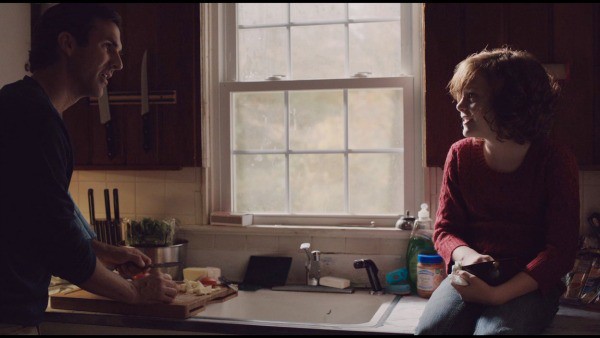
VINYARD: Yeah, and you have a great child performance by Audrey Scott, which I can't imagine is the easiest thing to a. find a child actor who can realize your vision, and b. direct them on set. Was that tough, finding Audrey?
ANGUS: it was challenging. I think (we looked at) probably 50 girls from all over the world…not all over the world, but all over New York, L.A., some from Canada, mostly on Skype. (Audrey) actually lives in Houston, although she works quite a bit in L.A.. She's on PARKS & REC, she was in SECRETARIAT, she's in a number of movies. She's a real little actor. She's also incredibly professional. A lot of child actors, their energy flags or they get irritated, and she was right there all the time. She was delightful to work with, she knew what she was doing, she has a really strong family. And she can really play, she can respond as an actor, which was great.
VINYARD: I don't know if she's a child of divorce- I'm assuming she isn't- but she seemed to be coming at it from a very honest place which seemed like it was coming from experience, which was very impressive.
ANGUS: Yeah, her parents are very much together in real life. She's just acting.
VINYARD: You mentioned Phil Morrison, who directed your first produced script, JUNEBUG. This is your first movie as a director. Did you call on him for any advice or anything like that? What was your mindset going in as a first-time director?
ANGUS: I was terrified. It was the scariest thing I had ever done, mostly because there's such a technical aspect that I didn't…'cause I never went to film school. I knew kind of what a script supervisor did, but not all of it. Or the first A.D., what the extent of their job is on the set. What I felt confident about was directing actors, because I am an actor I felt very comfortable about that. People kept saying, "Get a great first A.D., and a great director of photography, and you'll be set." I had a wonderful first A.D., Scott Larkin, and I had a great D.P., Corey Walter, and all three of us got along really well, which is terrific.
And I did ask Phil for advice. He was busy on a movie he was making while I was prepping my movie. Didn't give me a lot of…I kid him now, because I was like, "What do I do?!" And he went, "I don't know, I can't tell you." But in the post, he was incredibly helpful, 'cause he and I…he's a very good friend of mine, so we see things very similarly. He came in I think three times when I was editing it, and he would see what I was trying to get out of it. He would say two words, like, "Maybe you don't need this, or maybe this." He was the best at giving notes, and was very, very helpful in the editing process. But yeah, I've given him enough on how he was not particularly helpful beforehand.
VINYARD: 'Cause he was working on ALL IS BRIGHT (a.k.a. ALMOST CHRISTMAS) I guess?
ANGUS: Yes, exactly.
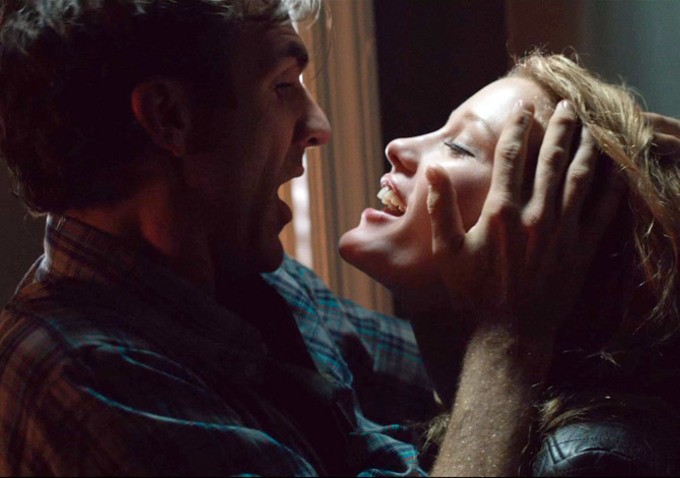
VINYARD: Besides Phil, who influenced you going into it your first time? I saw on Criterion, you'd mentioned a few movies you liked on Criterion. A lot of Bergman, some Antonioni, were they a couple of people who were kind of swimming around in your mind when you were on set?
ANGUS: All those people, and Jean Renoir, particularly his early films, like RULES OF THE GAME. The way he portrays humanity in such a loving way that's funny, and non-judgemental in some way. So many. Hal Ashby's films, Paul Mazursky, and Kenneth Lonergan, I loved YOU CAN COUNT ON ME. That's one I'd point to. Things like that. The STATION AGENT guy, Tom McCarthy. They're all people making films that were in sort of similar veins, very human, very strong performances. They were of course in my head, hoping that mine would be somewhat like these.
VINYARD: Like Ashby and Mazursky's movies, the movie has a very comedy-drama tone, and it fluctuates between comedy and drama pretty extremely. Some scenes are played strictly for laughs, and some scenes are played strictly for pathos. Was that tricky at all for you, as either a writer or director, keeping that straight in your head?
ANGUS: It wasn't particularly, because that's what I feel about life. Life is that way to me, it's horrifying and funny at the same time. Those are the kind of films I like the most. Also in the theater. A lot of really great, very serious theater is incredibly funny. I just recently rewatched WHO'S AFRAID OF VIRGINIA WOOLF. When it's onstage, it's a comedy. It's really funny. Audiences laugh throughout the whole thing, and it's a harrowing drama. Those are the things that I like the best, things that have both elements.
VINYARD: I hear a lot of people having a really hard time getting mid-budget movies off the ground, but this seems like a really low-budget movie. Can you talk about what it was like to get the financing, and how you had to sell the movie, etc.?
ANGUS: It was cobbled together by private funding. We didn't do any Kickstarter things. It was just me going and asking for money. Now, it's very hard for smaller independent films to get out there. That's the challenge now. The world is really changing, and to get a theatrical release is very difficult. It was particularly difficult this time because our stars are not big stars, and the genre is not…"We certainly like the film, but it's not an out-and-out comedy, and it's not an out-and-out drama. We don't know how to sell it." So it was a challenge.
VINYARD: I'd imagine if you had a more well-known lead, it would've been an easier sell, but Paul Schneider is phenomenal in the role, and I can't imagine anyone else nailing that as well as he did. Can you talk about how you landed on him as your lead?
ANGUS: He's someone I've really liked for a long time, and he always seems like an actor who's thinking. It was a particularly delicate role to cast; you had to believe he was attractive enough that these women would want to sleep with him, and you had to believe he was a father, but he couldn't be too attractive or he'd seem kind of sleazy in a way. I kept saying when we were casting, when the producers would be like, "What about this person who's a little better known? He's on a TV show!" And I would say, "No one will see this movie because the second banana on a popular TV show was in it, they'll only see it if it's good!" So I really wanted the best actors, but it has made it challenging in the business. They were correct! It really is challenging to sell it.
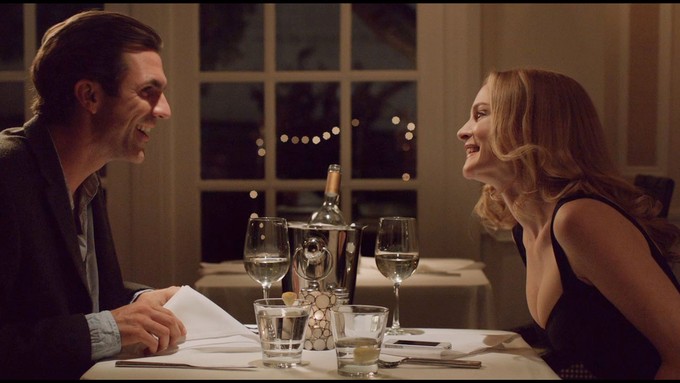
VINYARD: Last question: I want to ask about the title. The title is also the title of an autobiography by Robert Graves, who wrote I, Claudius and stuff like that, about him leaving Britain after WWI in the years preceding WWII. Is it a reference to that, that book from the '20s?
ANGUS: Peter Bogdanovich is a friend of mine. He told me about that book a number of years ago, and I read it, and it was a great book. And it was such a great title, that when I was writing this, I thought, "Well that's a great title. Maybe I'll reappropriate it, or sample it…actually I stole it. It's in the public domain, so I could do that. I subsequently found that Nora Ephron wrote a very famous essay that was called that, and Roger Ebert also wrote a famous essay (with the same title). There's a book out now that's called Goodbye to All That, that's about New Yorkers leaving New York. There's even a band Goodbye to All That, so a lot of people have used it.
But yeah, it is about him losing his family and having to say "Goodbye to all that," but also moving to a different consciousness by the end of the film. I just really liked the title.
VINYARD: So where do you think he's at at the end of the movie? There's no grand catharsis, but he decides to build his daughter her garden, so obviously there's been some sort of growth. It's not a huge change, but can you talk about his differences at the end of the movie versus the intro?
ANGUS: Well, a lot of people were like, "Didn't you want him to leave with Lara and go to Costa Rica?" And of course you want that, because we're all primed to have a sweet ending like that, but he hasn't earned the right yet to do that. The most important thing in his life right now is his daughter, and he's got to make her feel safe and build this castle, or this garden, and the last little bit is him really looking at her, really paying attention to her. There was a draft at one time where you saw slides like "9 months later," he and Edie are in Papua New Guinea helping Lara with a building project, but of course we couldn't do that, and we didn't think it was needed anyway. I think he has moved to a different consciousness because of the experiences that have happened to him.
GOODBYE TO ALL THAT is playing the IFC Center in New York City this week, and is currently available on Youtube, Amazon, Google Play, Xbox Video, and various other VOD formats. Keep an eye on the film's Facebook page to see if the film's coming to your neighborhood in the next few weeks.
